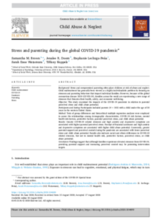Displaying 561 - 570 of 2509
The Center for Digital Development is looking for a short-term consultant to help with the Protecting Children from Digital Harm initiative.
This study aimed to explore questions relating to caseworker’s training on ethnocultural diversity in connection with racial disparities and overrepresentation of Black children in child welfare services.
This study explored if domains of the Child and Adolescent Needs and Strengths assessment were associated with a prescribed trauma-focused treatment.
This study examined the relationship between material hardship and parenting stress among grandparent kinship providers, and assessed grandparents’ mental health as a potential mediator to this relationship during the COVID-19 pandemic in the United States.
This study examines an unexplored consequence of COVID-19 school closures: the broken link between child maltreatment victims and the number one source of reported maltreatment allegations—school personnel.
This study examined the impacts of the COVID-19 pandemic in relation to parental perceived stress and child abuse potential.
This brief from Child Trends explores the transition to adulthood for young people with foster care experience in the U.S., including federal policies impacting the transition.
The purpose of this project was to determine if there were differences in learning outcomes between learners who completed child protection training in the usual delivery methods (Pre-COVID) and the fully virtual delivery methods (Post-COVID).
The purpose of this study was to inform states’ efforts to better design and implement extended foster care (EFC), examining the impact of the policy change on length of EFC stay and factors associated with youth’s time in EFC.
"The Trump administration has been using major hotel chains to detain children and families taken into custody at the border, creating a largely unregulated shadow system of detention and swift expulsions without the safeguards that are intended to protect the most vulnerable migrants," says this article from the New York Times.

